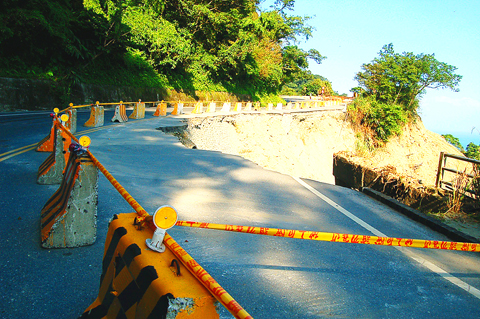Premier Wu Den-yih (吳敦義) said yesterday the government was set to allocate a budget of NT$40 billion (US$1.25 billion) for the construction of a new mountain highway connecting Suao in the northeast and Hualien in the east.
The statement followed a decision by the Ministry of Transportation and Communications late last month to scrap a controversial Suhua Expressway project and instead propose building a less ambitious mountain highway that may intersect with parts of the existing highway.
The government will tender work on the proposed highway by the end of the year after the project passes an environmental impact assessment, while some latitude will be kept for future upgrades, he said.

PHOTO: YANG YI-MIN, TAIPEI TIMES
In his capacity as Chinese Nationalist Party (KMT) chairman, President Ma Ying-jeou (馬英九) solicited grassroots opinion on the matter on Sunday while campaigning in Hualien County for Wang Ting-sheng (王廷升), the KMT candidate in an upcoming legislative by-election.
He relayed grassroots calls in favor of the mountain highway at the weekly coordination meeting attended by Ma and Vice President Vincent Siew (蕭萬長), the heads of the Executive Yuan, the Legislative Yuan and the KMT.
Wu said in the meeting that an additional NT$1.8 billion would be allocated to improve the Suao-Hualien Highway that cuts through coastal cliffs and is vulnerable to landslides.
Improving transportation links between the two areas on the east coast has long stirred controversy.
An expensive expressway was proposed more than a decade ago but has faced strong opposition from environmental experts and activists who said it would destroy the flora, fauna and ecological balance in the area.
With many unconvinced that simply repairing the highway would solve Hualien’s transportation woes, the mountain highway was proposed as a compromise.
At present, Hualien County can be accessed from the north by the mostly single lane Suao-Hualien Highway and from the west by a windy road that cuts through the central mountains.

The Mainland Affairs Council (MAC) today condemned the Chinese Communist Party (CCP) after the Czech officials confirmed that Chinese agents had surveilled Vice President Hsiao Bi-khim (蕭美琴) during her visit to Prague in March last year. Czech Military Intelligence director Petr Bartovsky yesterday said that Chinese operatives had attempted to create the conditions to carry out a demonstrative incident involving Hsiao, going as far as to plan a collision with her car. Hsiao was vice president-elect at the time. The MAC said that it has requested an explanation and demanded a public apology from Beijing. The CCP has repeatedly ignored the desires

Many Chinese spouses required to submit proof of having renounced their Chinese household registration have either completed the process or provided affidavits ahead of the June 30 deadline, the Mainland Affairs Council (MAC) said on Thursday. Of the 12,146 people required to submit the proof, 5,534 had done so as of Wednesday, MAC deputy head and spokesperson Liang Wen-chieh (梁文傑) said. Another 2,572 people who met conditions for exemption or deferral from submitting proof of deregistration — such as those with serious illnesses or injuries — have submitted affidavits instead, he said. “As long as individuals are willing to cooperate with the legal

The Ma-anshan Nuclear Power Plant’s license has expired and it cannot simply be restarted, the Executive Yuan said today, ahead of national debates on the nuclear power referendum. The No. 2 reactor at the Ma-anshan Nuclear Power Plant in Pingtung County was disconnected from the nation’s power grid and completely shut down on May 17, the day its license expired. The government would prioritize people’s safety and conduct necessary evaluations and checks if there is a need to extend the service life of the reactor, Executive Yuan spokeswoman Michelle Lee (李慧芝) told a news conference. Lee said that the referendum would read: “Do

Taiwan's Vice President Hsiao Bi-khim (蕭美琴) said Saturday that she would not be intimidated by the Chinese Communist Party (CCP), following reports that Chinese agents planned to ram her car during a visit to the Czech Republic last year. "I had a great visit to Prague & thank the Czech authorities for their hospitality & ensuring my safety," Hsiao said on social media platform X. "The CCP's unlawful activities will NOT intimidate me from voicing Taiwan's interests in the international community," she wrote. Hsiao visited the Czech Republic on March 18 last year as vice president-elect and met with Czech Senate leadership, including